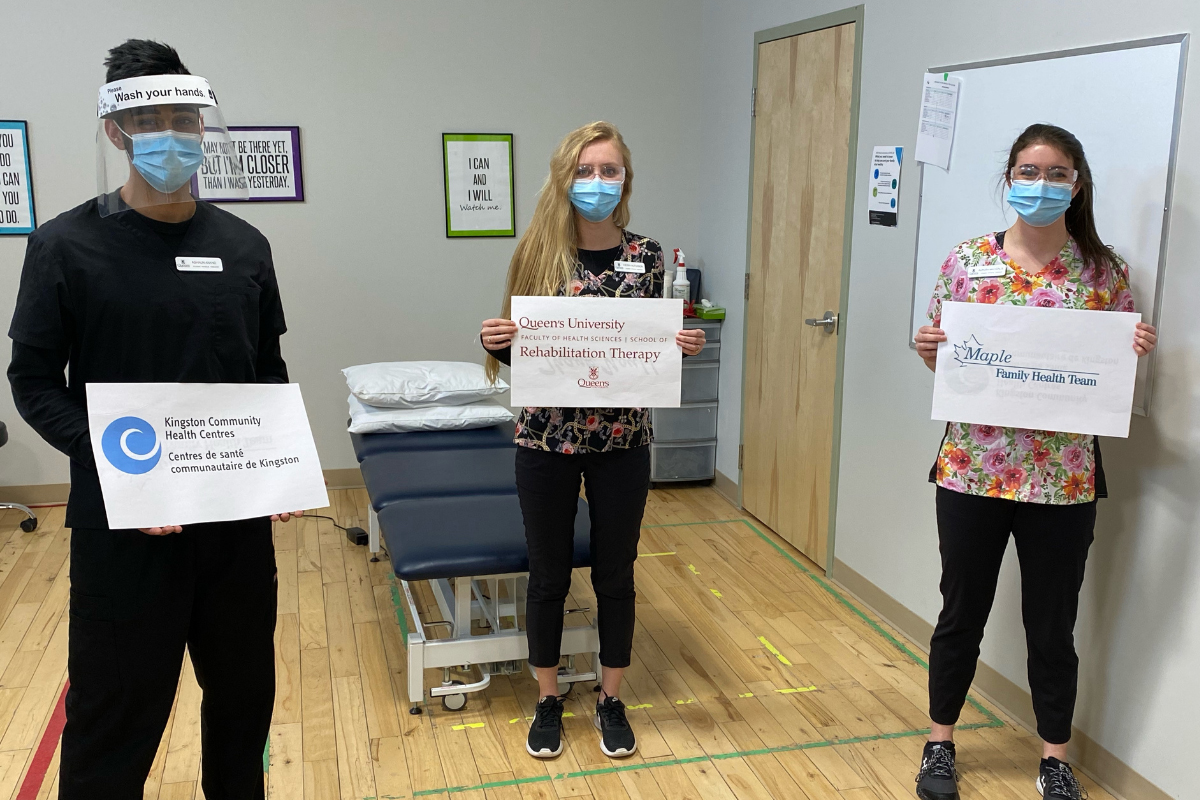Providing physiotherapy services to the Kingston community
April 9, 2021
Share

Rehabilitation professionals help people stay healthy and maintain physical function. However, there are many people who would benefit from rehabilitation services that are unable to do so due to a number of reasons including a lack of funding or transportation barriers.
Musculoskeletal disorders, like arthritis and low back pain, are among the leading contributors to years lived with disability worldwide and are some of the conditions that benefit the most from physiotherapy services.
Looking to address the problem of unmet rehabilitation needs within the Kingston community, the Queen’s School of Rehabilitation Therapy (SRT) partnered with the Maple Family Health Team and Kingston Community Health Centre to launch Rehabilitation Services at the Health Hub – providing rehabilitation services for those who are unable to access care elsewhere. Since its launch in January, the program has provided care for more than 80 patients while also providing an opportunity for SRT students to complete their placements in a new setting focused on the needs of the community. Discussions are underway to add services for other health conditions and occupational therapy services in the near future.
The Health Hub is supported by three to five students from the Queen’s Master of Science in Physical Therapy program at a time. Over the course of the program, these students must complete five six-week clinical placements. Due to the COVID-19 pandemic, placement availability was limited and additional barriers to attending rehabilitation services were introduced. The idea for the Health Hub came out of the need for a creative solution to this shortage.
Typically, student placements follow a traditional model where each supervisor is assigned to work with a single student. The Health Hub explores a more novel opportunity in which three students work with one supervisor. This model fosters a more collaborative approach to their learning and to the care being delivered.
“We had been looking to try out a new model where there were three or four students doing their placement together,” says Randy Booth, Academic Coordinator of Clinical Education for Physical Therapy in the SRT. “COVID-19 created the perfect opportunity – and motivation – to really innovate.”
The Health Hub’s major focus is educating and empowering patients, who may not have the coverage or financial means to pay for rehabilitation services, to manage their conditions. While many physiotherapy clinics may see patients for several shorter appointments, the Health Hub aims to have patients in for no more than three to five appointments. The longer appointment times allow practitioners to focus on developing and promoting patient independence and to pursue exercise as part of an overall self-management process tailored to their goals and daily routines.
_________________________________________________________________________________________________________________________
Read More: Queen’s medical students helping with Kingston’s vaccination rollout
_________________________________________________________________________________________________________________________
The strategy has received overwhelmingly positive feedback with 96 per cent of surveyed patients expressing satisfaction with their experience. The same proportion of patients say that with the longer appointments they had enough time to discuss their health issues and that they could better manage their conditions moving forward.
Members of the SRT approached Maple Family Health Team and Kingston Community Health Centre with the idea of using the Health Hub to test out the model. Both were eager to support the initiative.
“Without our partners we would not have had the space or the funding to operate this clinic. They are also referring a steady stream of patients to work with our students,” Dr. Booth says. “Our partners understand the importance of providing these services to individuals to who have not had easy access in the past. All of us at Queen’s are tremendously grateful for the work that they do to support the clinic. It allows us to have a huge impact on the lives of so many individuals.”
STUDENT EXPERIENCE
Halle Pawson, a first-year Physical Therapy student, says that the Health Hub placement provides a great learning opportunity. During her placement, Pawson was involved with every aspect of the physiotherapy process, including assessing and diagnosing patients, providing physiotherapy, and educating patients on how to manage their conditions. She says that her time at the Health Hub taught her a lot about treating patients and the factors that can influence their recovery.
“It was eye opening to me how much more there is to physical health disorders beyond just the physical aspect,” she says. “In order to tailor treatment to a patient you have to understand the kinds of activities they engage in, the setting that they work in, the amount of free time they have and so much more. For example, if a patient is a single parent, then you have to adjust your strategy to account for the limited amount of time they have to themselves. I’ve also learned a lot about patient’s mental health, how it can affect a person’s physical health disorder, and the other way around.
“A lot of people come in with chronic pain that they’ve been experiencing for years and they are convinced that it’s going to be with them for the rest of their life. At Health Hub we really tried to focus on the idea that you can get better, and I noticed firsthand the difference that changing one’s mindset can have on patient’s recovery.”
Looking forward, Dr. Booth is hoping that the lessons being learned at the Health Hub can help the clinic expand and host a more multidisciplinary team of students in the future.
“It would be really cool if we brought in a healthcare team of students,” Dr. Booth says. “I could see a model where you have a physiotherapy student, an occupational therapy student, a nurse practitioner, and a medical student or family medicine resident and they are all able to learn about each other’s roles in an inter-professional environment. We are seeing such positive results with the Health Hub right now and I can’t wait to see where this initiative goes from here.”